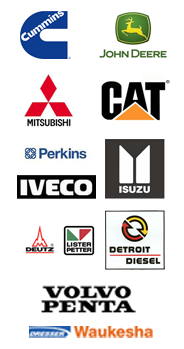Dual Fuel
 DUAL FUEL PROCESS
DUAL FUEL PROCESS
Dual Fuel engines operates on both natural gas and diesel fuel simultaneously. The majority of the fuel burned is natural gas. The diesel fuel acts as a pilot for combustion that ignites under the heat of compression. The use of diesel fuel allows the retention of the diesel compression ratio and its efficiency while the natural gas contributes to economy and is responsible for lowering emission. Typically, the ratio of natural gas to diesel fuel 80:20 although experimental system are being designed to operate at as high ratio as 95:05 ! There are basically two methods of converting a diesel engine to dual fuel.
 CONTROLLED GAS INJECTION
CONTROLLED GAS INJECTION
In this technique, natural gas is introduced into the cylinder through a specially designed gas injector. Electronically controlled Dual-Fuel Units interface via software with existing engine fuel management system that allows the two computers to communicate. In such system, the gas control unit commands the diesel controller and issues a request for a diesel pilot injection of a specific quantity at a specific time. Simultaneously it sends a signal to the natural gas injectors to inject an appropriate quantity of natural gas into the cylinders. This quantity is calculated in real time through existing conditions and is based on factor such as manifold pressure, charge air temperature, gas pressure, gas temperature and fuel mapping to provide the best combination of emissions and efficiency. These are extremely expensive system and can cost upward of US$ 20,000.00 for conversion of a typical 6 cylinder diesel engine.
CONTROLLED GAS CARBURATION
The second technique of conversion is to introduce the gas in the inlet manifold through a specially designed air gas valve/carburetor system.
This precision-engineered device allows an accurately controlled mixture of air and gas to be introduced into the cylinder through the inlet manifold in same application, the specialized air-gas valves can also be linked with an electronic control (and governing)system. The diesel fuel system retains full operability and its output is automatically adjusted to ensure that it only provides enough diesel fuel for the ignition process. The engine operates in a very reliable and safe manner and can achieve gas ratios of 80:20.
For stationary applications, natural gas is provided through the utility distribution network at controlled pressure and volumes through customized regulators and flow controllers.
For automotive applications CNG cylinders are used for fuel storage. While the steel ones are the cheapest, the weight and size restrictions prevent them from being used in large vehicles such as buses and trucks. In these cases light weight but exceptionally strong tanks constructed from polymers and space age materials are used. These tanks provide bulk fuel storage at very minimal weight penalties. These lightweight tanks can be mounted on the roof, underneath the vehicle or in any other desired location.






